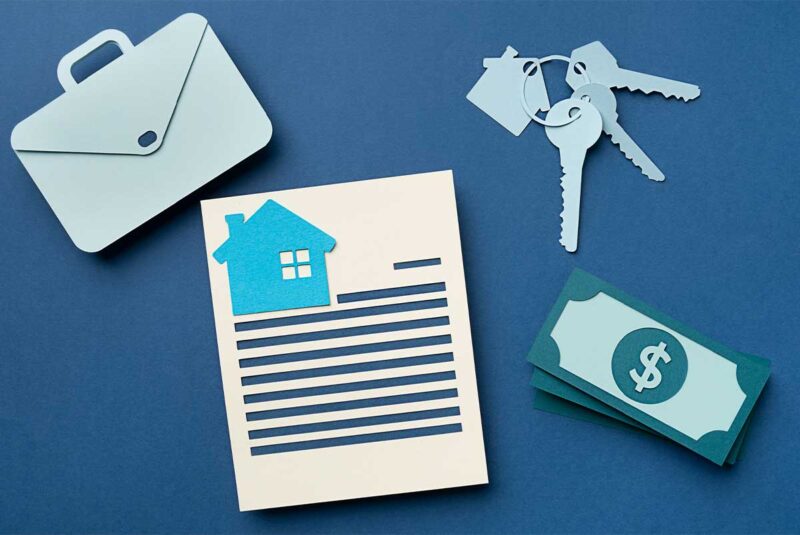Ready To Buy a Home?
Get Approved to Buy a Home
Rocket Mortgage® lets you get to house hunting sooner.
When a marriage ends in divorce, it’s hard for everyone involved. And once the split is complete, people will inevitably want to move on – and that may even include buying a new home.
Buying a new home will likely mean getting a mortgage. And lenders are going to want to get a complete picture of your overall financial situation (like it is with any mortgage application).
Depending on how entwined your finances were with your ex, you will need to provide documentation to demonstrate that you can individually make your mortgage payments after your divorce. Similar to applying for a mortgage on your own, some of the required financial information a lender will need may include:
- Proof of income (a W-2 or other documentation if you’re self-employed)
- Copies of credit card, student loan, auto loan and other debt statements
- At least 2 years of tax documents (preferably showing you filing separately from your ex)
What many people don’t realize is that the alimony you pay could count as debt and any alimony you receive could count as a source of income.
Which means whether you get it or pay it, it can affect your ability to qualify for a mortgage.
What Is Alimony?
Sometimes referred to as spousal support or spousal maintenance, alimony is a court-ordered payment (or series of payments) from one spouse to another after a divorce. The amount you pay in alimony is typically based on:
- Your state’s divorce laws
- The length of the marriage
- The difference in income between spouses
- The terms of any prenuptial agreement(s)
Alimony can be paid all at once, for a few months or in monthly installments over a period of years.
Keep in mind, alimony isn’t the same thing as child support payments (court-ordered money paid by one parent to cover another parent’s child care costs) These payments are typically based on parental income and how parents are dividing custody of their children, and it usually ends when the child turns 18.
Like alimony, child support can count as debt or as income that your lender will take into consideration when reviewing your mortgage application.
Can You Qualify for a Mortgage if You’re Paying Alimony?
Paying alimony won’t prevent you from getting a mortgage, but it may count as a monthly debt and get added to the debt side of your debt-to-income (DTI) ratio.
What is your DTI?
Your DTI is a calculation lenders use to determine how much of your monthly income goes to paying off your monthly debt.
If you’re paying alimony and/or child support, you’ll add the amount you pay to your other monthly debts – like rent or mortgage payments, credit card minimum payments, student loans, auto loans and other fixed monthly bills.
Once you’ve added up your debts, you’ll divide that total by your gross monthly income (what you make before taxes and payroll deductions are taken out) to calculate your DTI.
To qualify for a mortgage, most lenders prefer a DTI of 43% or lower. The lower your DTI, the better your chances of qualifying for a mortgage. The lender will also use your DTI to decide how much you can borrow, the loan’s interest rate and other terms on the loan.
Need a handy tool to help figure out your DTI? Check out our calculator to make life simpler.
How does alimony affect your DTI?
If you anticipate making regular alimony and/or child support payments for 3 years or more, you’ll need to include these payments when you’re calculating your DTI.
Traditionally, your lender would add alimony and/or child support payments to your recurring, monthly debt (which would increase your debt).
But a recent rule change gives lenders the option to subtract alimony and/or child support payments from the income side of the equation if you have 10 months or more of payments left to make.[1]
It may not seem like a big deal, but it can affect your DTI and your ability to get a mortgage.
Let’s say our (fictional) ex, Jordan, has the following financial profile:
- Gross monthly income: $4,000
- Monthly debt obligation: $1,000
- Alimony payment: $600
Now let’s see what happens if Jordan’s lender includes alimony as debt or subtracts it from Jordan’s income.
- Adds alimony to debt: $1,600 ($1,000 + $600) / $4,000 = 40% DTI
- Subtracts alimony from income: $1,000 / $3,400 ($4,000 – $600) = 29% DTI
As you can see, whether the lender decides to add that $600 in alimony to Jordan’s debt or subtract it from Jordan’s income can make a big difference in DTI.
Jordan’s best bet is to ask a lender, whether he is changing where he lives or just wants to know how his alimony payments might affect his current mortgage. He (or you) could start with our MoneyTips vetted recommendation:
Can You Qualify for a Mortgage if You’re Receiving Alimony?
If you receive alimony and/or child support, it can count as income. And that would improve the income side of your DTI. The more income you can show, the stronger your mortgage application will be, and you may be able to get a bigger loan.
For alimony and/or child support to qualify as income, your lender will want to know the amount(s) and how long you’re scheduled to receive payments.
You’ll need to provide your lender with the terms of your alimony and/or child support agreement(s) along with a copy of your divorce decree or separation agreement. The documentation should show how much alimony and/or child support you’re getting and for how long you’ll be getting it.
If you’re applying for a conventional loan, you’ll need to provide your lender with proof that your former spouse has made payments for 6 – 12 months. If you’re applying for an FHA loan, you’ll need to show proof of payment for at least 12 months.[2]
Getting a Mortgage After Untying the Knot
You’re not limited to dreaming about getting a home after a divorce – you can get one. Alimony and/or child support payments can affect your ability to get a mortgage, but they can’t stop you from becoming a homeowner. Whether you’re paying or receiving alimony and/or child support, there are ways that you and your lender can position your payments (or your receipt of payments) to get the best mortgage interest rate possible.
Get approved to buy a home.
Rocket Mortgage® lets you get to house hunting sooner.
The Short Version
- Paying or receiving alimony after a divorce can affect your ability to get a mortgage loan
- Paying alimony can count as debt and receiving alimony can count as income – both will affect your debt-to-income (DTI) ratio
- Depending on your mortgage lender, alimony payments may be considered a monthly debt or as a reduction in your gross income
Fannie Mae. “FAQs: Monthly Debt Obligations.” Retrieved October 2021 from https://selling-guide.fanniemae.com/Underwriting-Borrowers/Liability-Assessment/Monthly-Debt-Obligations/2287443801/FAQs-Monthly-Debt-Obligations.htm#Alimony
U.S. Department of Housing and Urban Development. “Handbook 4000.1, FHA Single Family Housing Policy Handbook Updates.” Retrieved October 2021 from https://www.hud.gov/sites/dfiles/OCHCO/documents/4000.1hsgh_20191024.pdf




